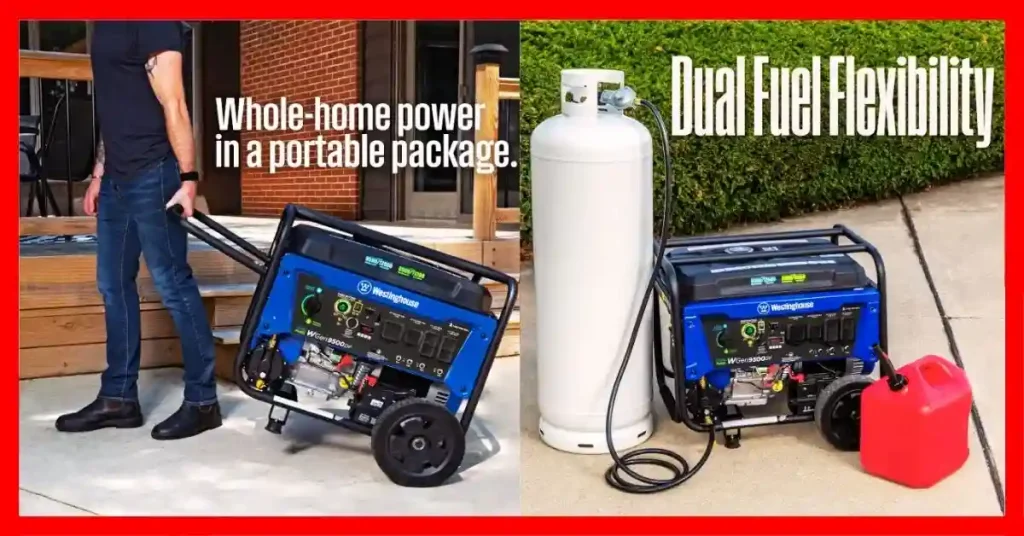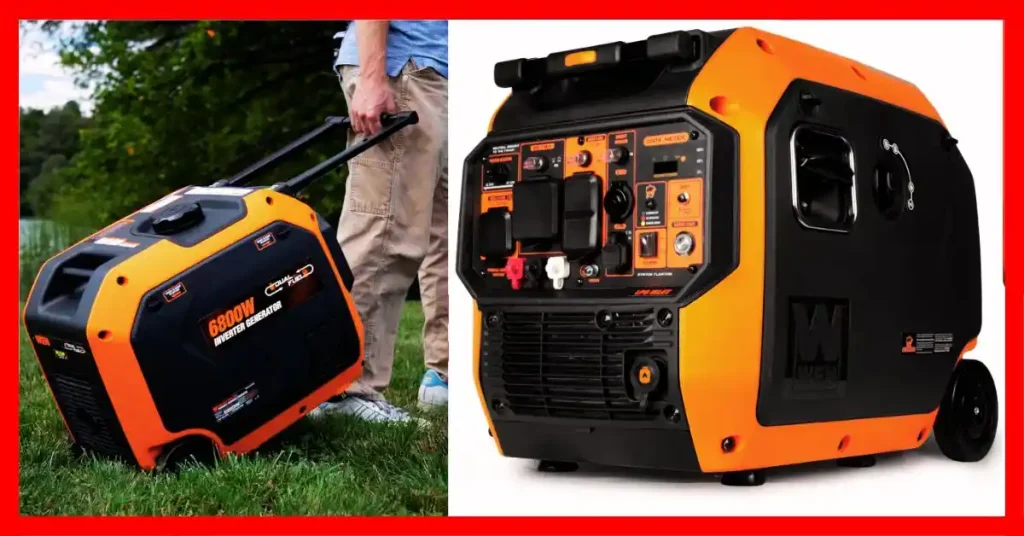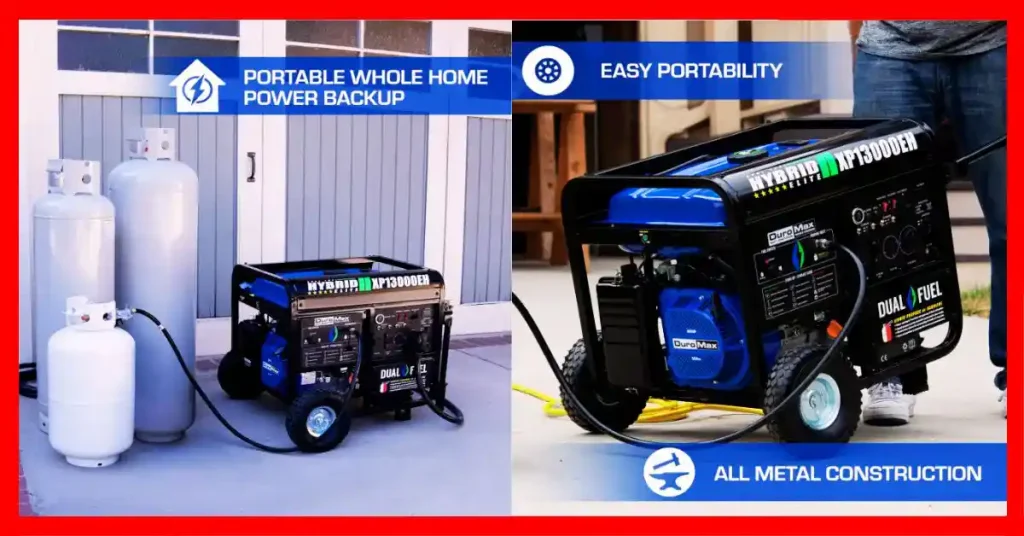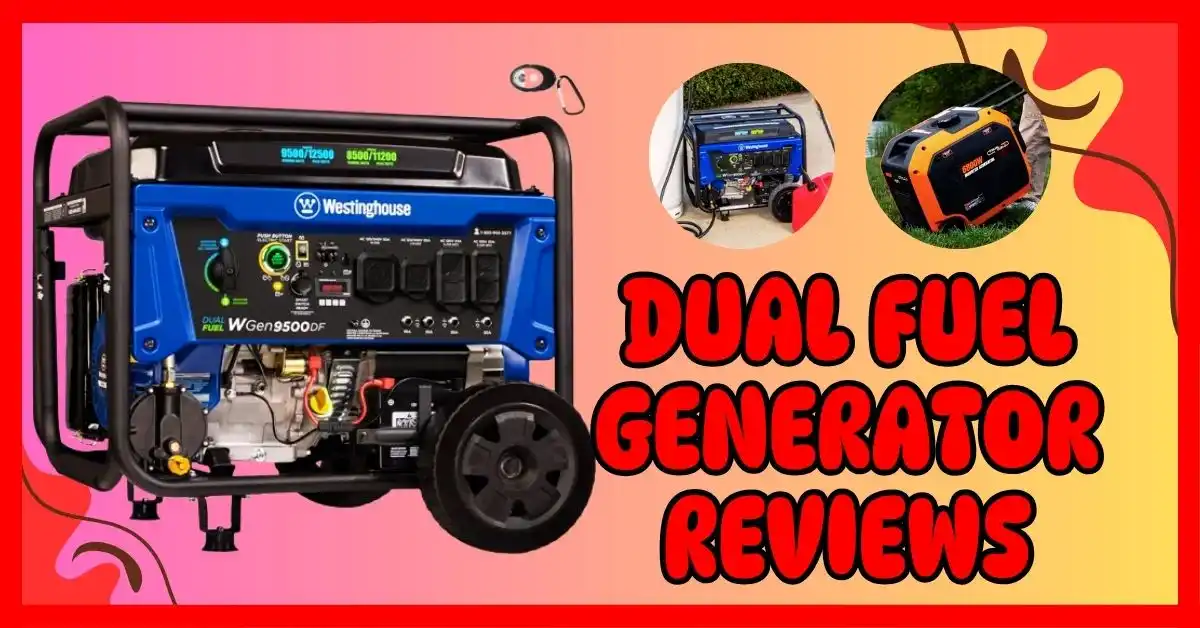The power went out one night, and I froze. The lights were gone. The fridge went quiet. The house felt empty. That’s when I first searched for dual fuel generator reviews. Since then, I’ve tried many. Some can power a whole house. Others are light enough for camping. In this guide, I’ll show you the best dual fuel portable generators for home, RVs, and trips.

What Is a Dual Fuel Generator? (Quick Guide)
A dual fuel generator runs on gasoline or propane. You get two fuel options in one machine. If the gas runs out, you can switch to propane. This keeps your lights and fridge on during an outage.
People like dual fuel because it gives flexibility. Gas is strong and easy to find. Propane is cleaner and lasts longer on the shelf. Having both means you are ready for storms or long power cuts.
I once used only a portable gas generator. The fuel ran out fast during a blackout. Switching to dual fuel changed everything. I could hook up propane and get hours more runtime.
Some worry propane may not be strong enough. It gives a bit less power than gas. But for homes, RVs, or camping, it works just fine. The real benefit is peace of mind. You always have a backup fuel ready.
Best Dual Fuel Generator Reviews (My Top Picks)
I tested several dual fuel generators to see which ones work best. I checked power, runtime, noise, and how easy they are to move. Here are my top picks.
1. Westinghouse 12500 Watt Dual Fuel Generator
This generator gives 9,500 running watts on gas and 8,500 on propane. It has multiple outlets and a remote start key fob.
Best for: whole-home backup.
I liked the remote start and strong build. It is heavy at 210 pounds, but it can run a house with no problem.
2. WEN 6800-Watt Dual Fuel Inverter Generator
The WEN is quiet and light, 99 pounds, with 6,800 surge watts on gas and 6,000 on propane. It also has a CO sensor and EV charging ports.
Best for: camping, RVs, or small home backup.
It is easy to move and very quiet. It is not enough for a whole home, but great for trips or smaller needs.
3. DuroMax XP13000EH Dual Fuel Generator
The DuroMax is very powerful with 13,000 surge watts and copper windings. It has many outlets, electric start, and strong wheels.
Best for: whole-home use, job sites, or heavy power needs.
It is rugged and reliable. It is heavy and less plug-and-play, but it works well if you need a top rated dual fuel generator.

Dual Fuel vs Single Fuel Generators (What I Learned)
At first, I thought a gas-only generator was enough. Gasoline is easy to find, and it gives good power. But I soon ran into problems. Gas goes bad if stored too long. Propane is cleaner and stores for years. But propane-only generators give slightly less power.
A dual fuel generator solves this. It can run on gas or propane. You get the power of gas and the storage ease of propane. This flexibility is a big reason I switched. You can use gas when it’s easy to get. Switch to propane in emergencies or for long-term storage.
The trade-off? Dual fuel generators are heavier. They cost more. And they have extra parts to maintain. They are not as light or simple as single-fuel units. But for home backup, camping, or heavy use, the benefits usually win.
Brands like Westinghouse, DuroMax, WEN, Champion, and Honda make solid dual fuel models. I used Westinghouse for home backup—it’s strong but heavy. WEN is lighter and quiet, perfect for camping or RV trips. Each has its own sweet spot. In my opinion, a dual fuel generator is a safety net you’ll actually use, not just store.
How Long Does a Dual Fuel Generator Last?
Most dual fuel generators last 8 to 12 years if you take care of them. Some can last longer. Others may need more care after a few years. The trick is simple: check oil, store fuel safely, and do not overload.
Size and use matter. A small generator for camping lasts longer than a big unit for home backup. How often you run it and the fuel you use also matters. I had a DuroMax XP13000EH that ran strong for many years, even with heavy home use.
Fuel type matters too. Propane burns cleaner than gas. This means fewer engine deposits. Gas gives more energy per tank, so it can run longer. Switching between gas and propane helps keep the engine healthy.
In short, care is key. Follow the steps above, and your dual fuel generator lifespan can reach a decade or more. Treat it like a car, and it will be ready when you need it most.

How to Choose the Best Dual Fuel Generator for Your Needs
Choosing the right dual fuel generator depends on how you plan to use it. I have tried small ones for camping and big ones for home backup. Each type has a sweet spot. Ask yourself: do you need power, portability, or quiet operation?
For Home Backup
For home backup, go big. Look for 10,000 watts or more. This is enough to run essential appliances. I have used Westinghouse and DuroMax generators. They are heavy, but reliable. Think of them as a safety net when the power goes out.
For RV or Camping
Camping or RV trips need something quiet and easy to move. Small inverter-style dual fuel generators are best. I have used WEN’s 6800-watt model. It is light, quiet, and easy to carry. It powers lights, a fridge, or devices without waking the whole campsite.
For Small Jobs or Tailgating
For small jobs or tailgating, a small gas generator works well. You only need enough power for tools, a TV, or a grill. These generators are easy to carry and store. I keep one in my garage for weekend projects or parties.
No matter the type, think about your needs, how often you’ll use it, and where you’ll store it. Choosing the right generator saves stress and keeps it ready when you need it.
Pros and Cons of Dual Fuel Generators (My Real-World Take)
When I bought a dual fuel generator, I loved the choice. I can use gasoline or propane. If gas runs out, I still have propane. This flexibility makes dual fuel generators very useful.
They also run longer on propane. Propane burns cleaner. This means less engine wear and easier maintenance. I noticed mine starts easier on propane in cold weather. For power outages, this is a big relief.
But there are some downsides. Dual fuel generators are heavier than gas-only units. They cost more. The extra parts add weight and complexity. Propane gives slightly less power. The first time I tried mine on propane, the fridge and lights worked fine, but the central AC struggled.
Here is a simple table to see the differences:
| Pros | Cons |
| Can use gas or propane | Heavier than single-fuel units |
| Longer runtimes with propane | Higher cost |
| Cleaner fuel = less wear | Slightly less power on propane |
| Reliable in emergencies | More parts to maintain |
In my experience, the pros are worth it. Dual fuel generators may not be light or cheap. But they give peace of mind when the power goes out.

FAQs About Dual Fuel Generators
What is the disadvantage of a dual fuel engine?
Dual fuel generators are handy, but they have some downsides. They are heavier, cost more, and need a bit more maintenance than gas-only models. Think of it like carrying a Swiss Army knife instead of a simple knife—more tools, more weight. For me, the extra fuel choice is worth it. But if you just want light and simple, a small gas generator might work better.
Can I run a dual fuel generator on natural gas?
Most dual fuel generators only use gas or propane. Natural gas usually will not work. Some units can be modified, but that is rare. I once tried it, and the generator did not start. Stick to gas or propane unless the maker says it works.
How long does a dual fuel generator last on propane vs gas?
Propane burns cleaner than gas. That is easier on the engine. But propane has less energy per gallon. So it may run a bit shorter. From my experience, the difference is small. With good care, a dual fuel generator can last 8–12 years.
What size dual fuel generator do I need for home backup?
For full home backup, get at least 10,000 watts running power. Less than that will run only a few things, like lights or the fridge. I use a 12,500-watt Westinghouse. It powers my whole house during outages. Bigger gives more peace of mind. Smaller works for just essentials.
What are the best dual fuel generator brands?
The brands I trust most are Westinghouse, DuroMax, WEN, Champion, and Honda. Westinghouse and DuroMax are great for whole-home backup. WEN is perfect for RVs or camping—quiet and light. Champion and Honda are solid if you want long-lasting reliability.
Conclusion
Dual fuel generators are smart and flexible. You can use gas or propane. They run longer and cover many needs—home backup, camping, or tailgating. From my experience, having both fuel options makes life easier when the power goes out.
For my home, I trust the Westinghouse 12,500-watt model. It can run the whole house without stress. For camping or RV trips, I like the WEN 6,800-watt inverter generator. It is quiet, light, and strong enough for essentials.
The right generator depends on your needs. For full home backup, choose high wattage. For RVs or camping, pick quiet and portable models. For small jobs or short-term use, a small gas generator works well. Pick what fits your life, and you will be ready when the lights go out.
To Get More About Sports & Outdoors Product You Can Visit Our Site. If You Found our Posts Helpful Leave a Comment Below

